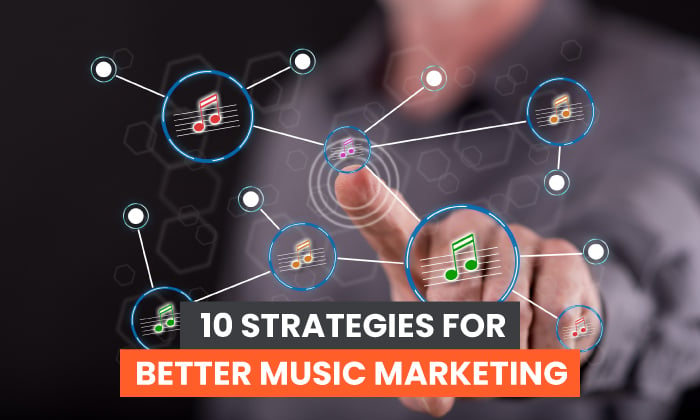
The advent of P2P file-sharing and streaming services changed music forever. If you only read the headlines, you might think the industry is on shaky ground. Google the phrase “Napster killed the music industry,” and you’ll see 242,000 results. Does that mean music marketing is dead?
Actually, the reality is very different. In fact, the music industry is growing at a healthy rate and has been every year since 2013. By the end of 2023, global revenue is projected to surpass $65 billion.
Not bad for an industry on its knees!
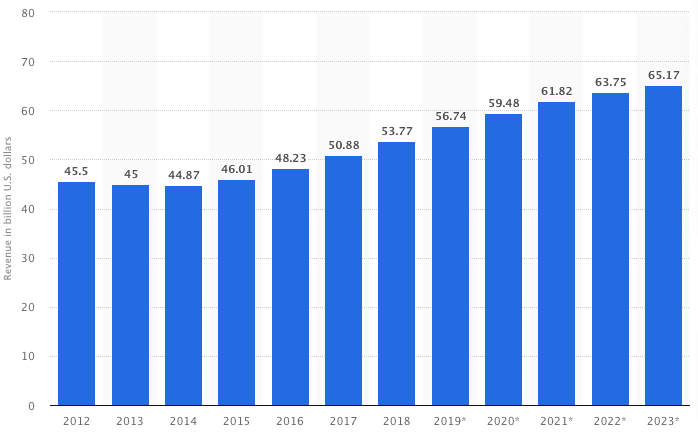
Despite this, music is a notoriously uneven playing field. Huge names like Paul McCartney, Jay-Z, and Madonna have become multi-millionaires, or even billionaires, off the back of their success. For every superstar, there are tens of thousands of unknowns.
Roughly 50 percent of artists tracked by online music analytics and insights provider Next Big Sound are considered “undiscovered.” These acts have small (and often shrinking) social followings, minimal views on Vevo and YouTube, and few (or no) radio plays.
Next Big Sound tracks hundreds of thousands of artists worldwide, but consider how many more artists it doesn’t know about. That proportion of “undiscovered” artists is likely much, much higher.
How do you make the leap from unknown to established?
For starters, you need to make amazing music. Beyond that, you need to get your music marketing spot on.
What Is Music Marketing?
Confusingly, the phrase “music marketing” can refer to a couple of different things:
- It can be about using music in a marketing campaign.
- It can be about artists marketing the music they create.
In this article, I’ll be talking about the second of those two categories.
10 Tips to Improve Your Music Marketing
I might not be a global music star (don’t worry; that’ll change when my mixtape drops), but I definitely know a lot about digital marketing. With that in mind, here are my top tips on how to improve your music marketing.
1. Have a Website
If you’re going to market yourself online, having a website is non-negotiable. It’s the one-stop-shop for everything about your act. If I want to check out your tour dates, book you for a show, read your backstory, or buy your merch, your website is going to be my first port of call.
There’s another big reason you should create your website: It’s a space you have total control over.
Sure, you’ll want to build a following on social media too, but third parties own those platforms. Those third parties can (and do) make frequent algorithmic changes that might dramatically reduce your reach overnight.
You don’t want your music marketing to be completely reliant on them.
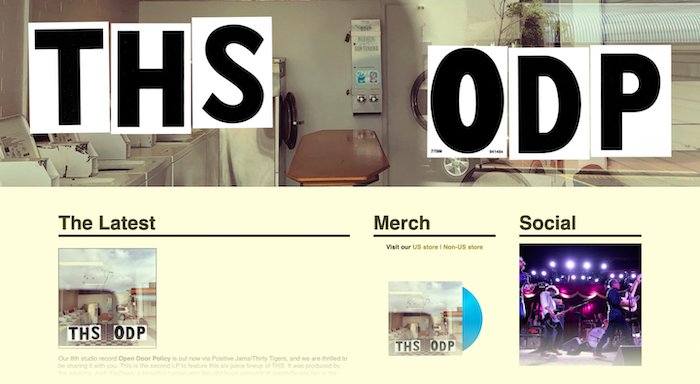
OK, so you need a website, but what should it include? Given that it’s your website, it could be anything. However, as a minimum, it should have:
- A news hub: A space for you to announce things like new releases, future tours, and media appearances.
- Merch store: Presumably, you want to make money as a music artist, so you definitely want an online store to sell things like hoodies, vinyl, or posters.
- Tour dates: People want to see you live, so tell them when and where they can do it (and provide information on how to get tickets.)
- Social links: Make it easy for people to find your social media profiles.
- Contact information: Whether it’s a fan wanting to ask a question or a venue owner who wants to book you, make sure you offer an email address, contact form, or some other way for people to get in touch.
- Music player: A built-in MP3 player (or similar) to make it easy for people to hear your music.
- Newsletter signup: Provide a way to sign up for a newsletter, which can help you build an engaged fan base.
- Your biography: People who land on your site have actively searched for you, so give them some detail about your background, your influences, and who you are as an artist.
2. Create an Electronic Press Kit
You might not need a record deal to make it as an artist (just ask Chance the Rapper), but you will need the media on your side to raise your brand profile.
That’s why you should have an electronic press kit (EPK). Creating an EPK and sending it out to publications, bloggers, radio stations, playlist curators, venues, record labels, festivals, and more can make it easier to secure bookings and generate buzz around your act.
A lot of artists incorporate an EPK on their website. That makes sense: It contains a lot of the same information anyway, plus if someone’s searching for your press kit, there’s a good chance they’ll start on your site.
What’s more, rather than emailing someone a PDF, you can just point them in the direction of your EPK landing page.
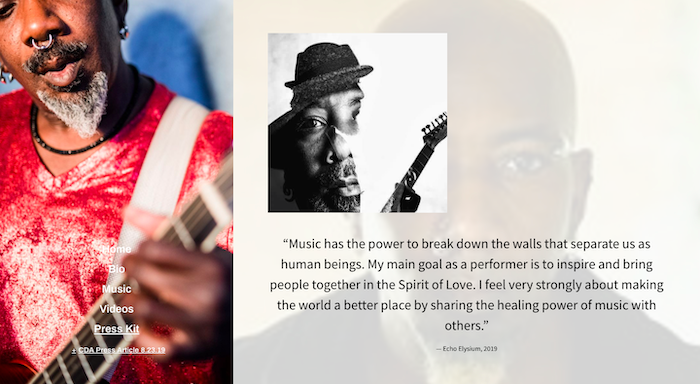
As I mentioned, there should be some crossover between your website and EPK. However, a good press kit is more than just an abridged version of your website. It should include:
- Your bio: In the context of an EPK, your bio is your elevator pitch. It’s how you might introduce yourself to someone in person. Make sure you keep it to no more than two or three sentences.
- Promo photos: Firstly, eye-catching imagery could make the difference between your EPK being looked at or ignored. Secondly, media publications or promoters might need visuals in a hurry, so ensure they’re high quality and include a range of formats (vertical and horizontal; color and black-and-white).
- Your music: These people may never have heard your sound before, so include links to your most popular tracks, or embed a music player within your EPK.
- Your videos: The press, venues, and festivals often embed music videos within their articles or artist pages, so include your best videos in your press kit.
- Press cuttings: Already generated some press attention? Add links and quotes from reviews and articles within your EPK to prove you’re worth talking about.
- Social links: While your website provides a more static snapshot of who you are, your social profiles should be updated regularly to give more real-time insight into your act. Add links to your most active profiles, preferably with engaged and growing followings.
- Contact details: Make it easy for people to book or write about you by gathering all your contact details in one place.
3. Create Social Media Accounts for Your Music
Once upon a time, music fans liked their favorite artists to be mysterious and aloof, today we want constant access to the acts we love. We want to know where you are, what you’re doing, and what’s inspiring you right now. Social media is where we go to find out.
Having a strong (and growing) social media following on sites like Facebook, Instagram, and Twitter can make a big difference for an up-and-coming act. Today, it’s not uncommon for artists to generate a ton of social buzz before the media have even noticed them.
Use your social presence to speak directly to fans, promote your music, announce new tour dates, and generally build a community around your work.
4. Create Interactive Content to Improve Music Marketing
Research shows consumers are more likely to think positively about your brand and buy your product (in this case, your music) when they interact with content that engages multiple senses.
What’s more, 43 percent of consumers say they prefer interactive video content over other types of video. Why? Because it lets them decide what information they want to see and when they want to see it.
In short, creating interactive content can be a big win for music acts. Here are a couple of examples of what it could look like:
Music Marketing Example 1: Wall of MF DOOM
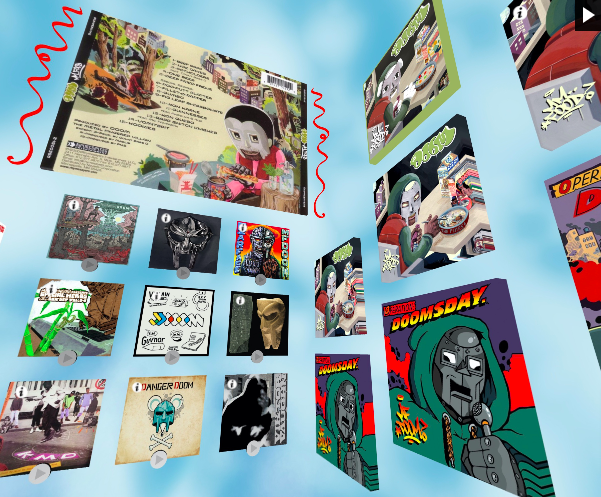
Shep Bryan, the co-founder of music marketing service Beaumonde, created an interactive tribute to legendary rapper MF DOOM. It allows fans to click around DOOM’s diverse discography, which incorporates all his numerous aliases and side projects. It’s kind of like an interactive Wikipedia page, plus it includes links to each album on Spotify.
Music Marketing Example 2: Dancing DJ Khaled
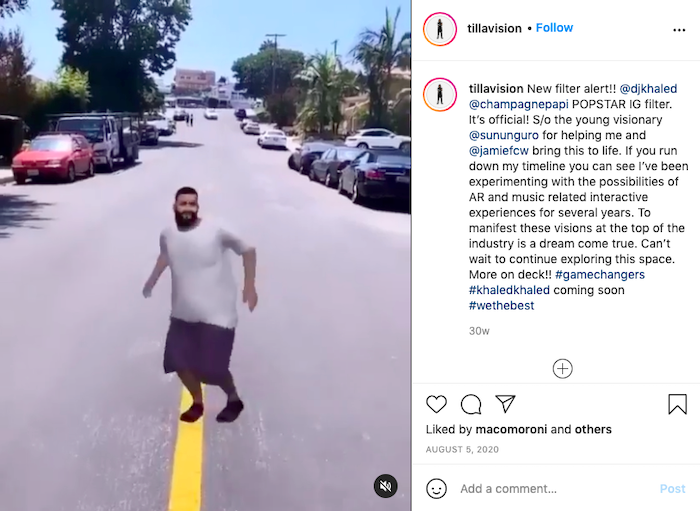
Augmented reality is another way to bring interactivity to your content, and this is a fantastic example of it in action. The idea here is that fans could create content featuring a dancing, AR version of DJ Khaled to promote the artist’s collaboration with Drake on the track POPSTAR. By creating and sharing videos, Khaled’s fans were doing a lot of the promo work for him.
5. Market Your Music Across As Many Platforms As You Can
Let’s take a look at people who like the band Weezer on Facebook.
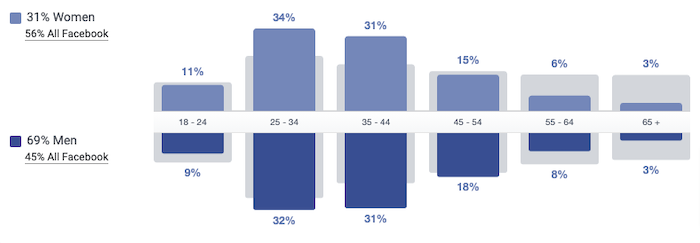
We can see the average Weezer fan is a man, aged 25 to 34, but there are also many in the 35- to 44-year-old range, plus decent interest among 18- to 24-year-olds (particularly women).
Chances are, not all of those fans exclusively use one specific digital platform. We know they’re on Facebook, but they’re likely in a lot of other places too. Those at the younger end of the spectrum may prefer platforms like TikTok and YouTube, while those at the older end might favor Pinterest and Twitter.
The same is true of your audience, too. That’s why it’s important to promote your music across a broad range of platforms, including social media sites and streaming services.
Also, don’t overlook opportunities to cross-promote across multiple platforms, such as by uploading your latest video to YouTube, then sharing the link via Facebook.
6. Build A Network to Market Your Music
Making the right connections can go a long way in your quest for recognition. However, you can’t just wait for those connections to come about organically. You need to put yourself out there and make it happen through networking.
Again, I’m not a world-famous musician, but I’ve done a lot of networking in my time. Here are some key tips on how to network effectively:
- Reach out via social: Find people who work in the right parts of the music business, track them down on social media, and connect with them. When you reach out, don’t immediately ask them to sign or book you. Strike up a conversation. Tell them you love their venue or work, ask them for advice, or contribute to their online conversations.
- Get face time: Simply put, be as active in your local community as possible. Play all the shows and open mics you can, attend workshops and conferences, and hang out at venues that book many local artists.
- Adopt a networking mindset: Every conversation can be an opportunity to network. You could be speaking to a local singer who wants to join forces for a few shows or someone at a charity that’s organizing a festival. Get used to carrying business cards and maybe even demo CDs, USB sticks, or download cards.
- Follow up: In sales, 80 percent of non-routine deals take at least five follow-ups to close. Music is likely no different. If you don’t make an effort to restart stalled conversations, don’t expect to see results through networking.
7. Email Marketing Campaigns for Musicians
Think email marketing is a relic from a bygone age? That it has no part to play in your music marketing strategy?
Think again. Email marketing can be extremely effective for raising your profile, building a community, and making money from your music. Why else do you think so many acts urge fans to sign up for their newsletters?
Statistics back this up. The average open rate for emails sent across all industries stands at 21.33 percent, whereas the music industry sees fractionally higher rates of 21.88 percent. Click rates are also slightly above average in music, at 2.94 percent vs. 2.62 percent.
In other words, if you send emails to your fans, there’s an above-average chance they’ll open them and click through the links within.
Consider the following when working on your email marketing:
- Incentivize fans to sign up: Try offering a free music download or a discount on merch.
- Follow up effectively: Once someone signs up, immediately send a thank-you email, plus any freebies you promised.
- Offer something of value: Give people a reason to stay subscribed, such as by offering insights into your creative process or advance announcements on new tour dates.
- Monetize your mailing list: Add impactful CTAs that drive readers to your merch or ticket stores.
- Stick to a schedule: Don’t bombard your subscribers. Unless you have big news like an album launch, an email every couple of weeks should be plenty, but test different frequencies and timings to see what works best.
8. Pitch Your Music to Media Outlets
The ultimate goal of your music marketing is to get in front of new audiences, so it makes sense to reach out to people and publications who already have engaged audiences of their own.
The types of brands you pitch to will likely vary depending on the type of music you make. If your local radio station exclusively plays hip hop, but you’re the next big thing in the oom-pah scene, it’s probably not going to work out.
However, as a general rule, you should try reaching:
- music and lifestyle bloggers
- music industry press
- local press
- local radio
- national radio
- playlist curators
On that final point, start by targeting unofficial Spotify curators. It’s unlikely you’ll break into one of Spotify’s in-house lists straightaway because they’re heavily influenced by user analytics. Popular unofficial playlist curators include:
- For The Love Of Bands
- Howard Zhu
- iMusician
- Indimono
- Soundplate
- Submithub
- Work Hard Playlist Hard
9. Create Merch to Market Your Music
You should definitely consider designing and selling your merchandise as part of your music marketing strategy.
For one thing, merch is big business, with global sales reaching almost $3.5 billion in 2018.
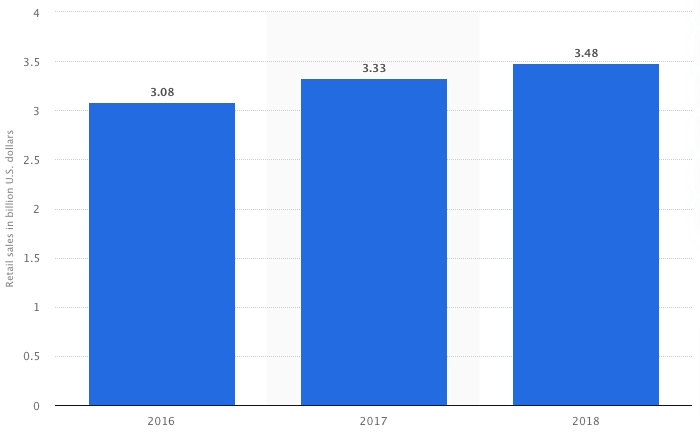
However, merch isn’t just a direct way to make money; it can be a marketing tool in its own right.
People love wearing band hoodies and tees to bars and gigs. If someone sees a hoodie they like the look of, maybe they’ll ask that person about the artist in question, Google them, or find them on Spotify. It’s like having a bunch of walking billboards!
10. Invest in Your Music, If Possible
The saying “It takes money to make money” might be a cliche, but it’s often true.
Facebook is a great example of this in action. Pages with fewer than 10,000 fans see engagement rates of just 0.52 percent for organic (that is, unpaid) activity, so if you have 9,999 fans, just over 50 will engage with your posts. That hardly seems worth the effort.
It must be better for larger, better-known pages, right? Wrong! In fact, pages with more than 100,000 fans see only 0.1 percent engagement.
Increasingly, social media is a pay-to-play environment. Ads can broaden your reach and engagement significantly, so it’s worth investing a little money to grow your brand.
Of course, it’s not all about social media. You might also consider hiring a PR agent to generate media buzz or team up with a creative agency to strengthen your branding.
Conclusion
Clearly, there are a lot of music marketing tactics in this article. Following all of these strategies will eat up a big chunk of your time, and you’re a musician, not a marketer.
I’m not suggesting you do them all immediately. Start by building your website, growing your social following, and networking with people in your local scene.
Once you’ve got the basics down, take things to the next level by launching ad campaigns and investing in eye-catching content.
What tactics have you used to attract more fans to your music?
from Blog – Neil Patel https://ift.tt/3cjFK8Z
via IFTTT
No comments:
Post a Comment